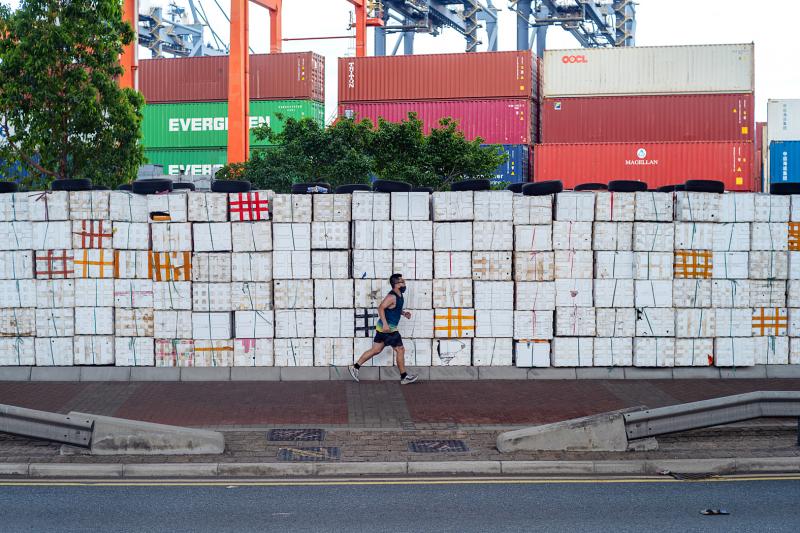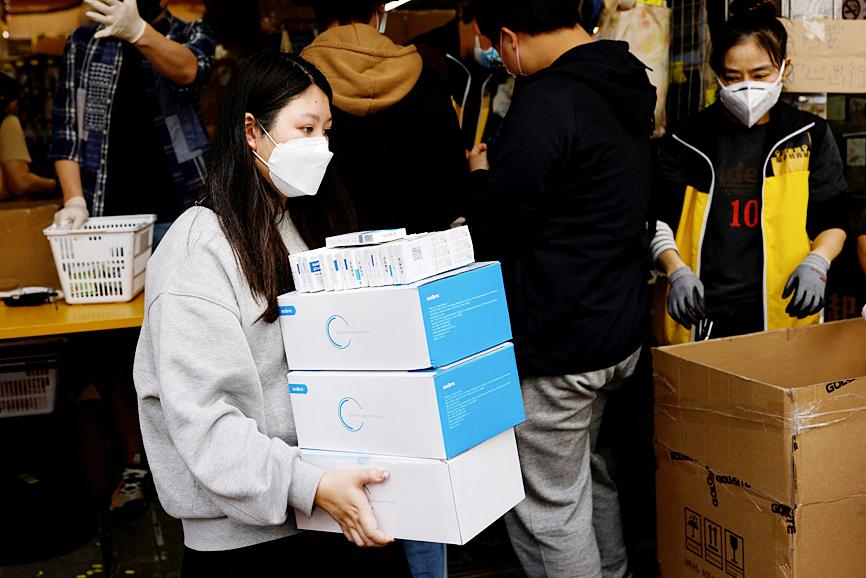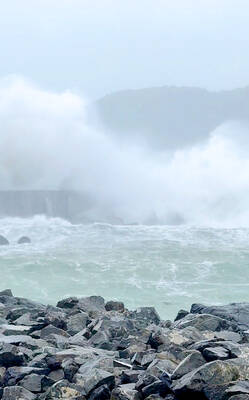A Hong Kong government rule that all school students and staff take daily COVID-19 tests would add massively to the territory’s plastic waste problem, environmentalists say, with about 20 million kits per month set to be dumped at bursting landfills.
The mandatory rapid antigen tests (RAT), and their plastic accessories are expected to worsen marine and land pollution in the territory of 7.4 million people, where some beaches and hiking trails are already awash with microplastics.
Each day, the school sector, which resumed face-to-face classes this month, would use 760,000 sets of RAT kits which include a plastic bag, tube and bottle, said Edwin Lau (劉祉鋒), founder of environmental organization The Green Earth.

Photo: EPA-EFE
“This is just the estimation for one day. So one can imagine the horrifying volume of waste due to the daily rapid test,” he said, adding that the government should have advised residents to recycle paper items and the plastic bag, but instead encouraged them to throw everything in the garbage.
“If they had advised the public [to recycle], the city would have saved at least some resources and reduced some waste,” he said.
RAT tests are already washing up on the pristine beaches of the Soko Islands, located to the far southwest of the territory.

Photo: Reuters
Over the past year Hong Kong has generated a colossal amount of disposable plastic waste from quarantine hotels and isolation facilities, which is not recycled due to fear of contamination.
The territory’s three landfills are almost at capacity as waste management has lagged mainland China and neighbors such as Taiwan and Singapore, even before COVID-19.
The government said in an e-mail response to questions that it was “reasonable to expect” a surge in disposable waste, such as masks, RATs and disposable plastic tableware. It encouraged a green lifestyle as “far as possible,” while having regard for public hygiene.
Official figures show a 33 percent rise in plastic disposables in 2020 with environmentalists expecting waste to have surged further since last year, as authorities grapple to implement a “dynamic zero” COVID-19 strategy.
Compounding the crisis are towering piles of polystyrene foam boxes on the streets since February. Used for daily deliveries of food from China, they are typically returned to the mainland for reuse, but truck drivers have been banned from taking them back across the border.
A dining ban, which prevented eating in restaurants after 6pm until Wednesday last week, has led to a surge in takeaway boxes being dumped.
Due to a mandatory mask rule, if every Hong Konger wears a single-use mask daily, it means “225 million masks potentially going to the landfill every month or ending up in our environment,” said Dana Winograd, cofounder and director of Plastic Free Seas.
“We have been doing this for two years,” she said.

FEROCIOUS FISH-EATER Scientists have found a new species of dinosaur from the Cretaceous Period, a ‘hell heron’ that stalked the rivers, deep in the Saharan desert At a remote Sahara desert site in Niger, scientists have unearthed fossils of a new species of Spinosaurus, among the biggest of the meat-eating dinosaurs, notable for its large blade-shaped head crest and jaws bearing interlocking teeth for snaring fish. It prowled a forested inland environment and strode into rivers to catch sizable fish like a modern-day wading bird — a “hell heron,” as one of the researchers put it, considering it was about 12 meters long and weighed 5-7 tons. The dinosaur presented a striking profile on the Cretaceous Period landscape of Africa some 95 million years ago as it hunted

Heavy rain and strong winds yesterday disrupted flights, trains and ferries, forcing the closure of roads across large parts of New Zealand’s North Island, while snapping power links to tens of thousands. Domestic media reported a few flights had resumed operating by afternoon from the airport in Wellington, the capital, although cancelations were still widespread after airport authorities said most morning flights were disrupted. Air New Zealand said it hoped to resume services when conditions ease later yesterday, after it paused operations at Wellington, Napier and Palmerston North airports. Online images showed flooded semi-rural neighborhoods, inundated homes, trees fallen on vehicles and collapsed

‘COST OF DEFECTION’: Duterte’s announcement could be an effort to keep allies in line with the promise of a return to power amid political uncertainty, an analyst said Philippine Vice President Sara Duterte yesterday announced she would run for president of the Southeast Asian nation of 116 million in 2028. Duterte, who is embroiled in a bitter feud with Philippine President Ferdinand Marcos Jr, was impeached last year only to see the country’s Supreme Court throw the case out over procedural issues. Her announcement comes just days before her father, former Philippine president Rodrigo Duterte, begins a pretrial hearing at the International Criminal Court (ICC) in the Netherlands over crimes against humanity allegedly committed as part of a brutal crackdown on drugs. “I offer my life, my strength and my future

NOT YET THERE: While the show was impressive, it failed to demonstrate their ability to move in unstructured environments, such as a factory floor, an expert said Dancing humanoid robots on Monday took center stage during the annual China Media Group’s Spring Festival Gala, China’s most-watched official television broadcast. They lunged and backflipped (landing on their knees), they spun around and jumped. Not one fell over. The display was impressive, but if robots can now dance and perform martial arts, what else can they do? Experts have mixed opinions, with some saying the robots had limitations and that the display should be viewed through a lens of state propaganda. Developed by several Chinese robotics firms, the robots performed a range of intricate stunts, including martial arts, comedy sketches and choreographed